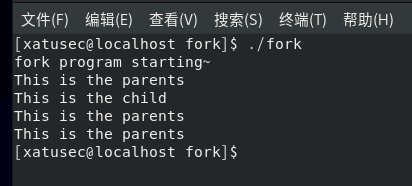Linux进程创建方法
system 创建进程
在一个程序内部启动一个程序,从而创建一个新进程
运行以字符串参数的形式传递给他的命令并等待该命令的完成
使用头文件和函数参数
#include<stdlib.h>
int system(const char* string);
#include<stdlib.h>
#include<stdio.h>
int main()
{
printf("Running ps with system\n");
system("ps ax");
printf("Done.\n");
exit(0);
}
execl 替换进程
#include<unistd.h>
execl
execlp
execle
execv
execvp
execve
6种写了常见的2种
#include<stdio.h>
#include<string.h>
#include<unistd.h>
int main(int argc,char *argv[],char *envp[])
{
if(strcmp(argv[1],"execl"))
{
printf(" argv = %s\n",argv[1]);
printf("execl!\n");
execl("/usr/bin/ps","ps",0);
printf("this is word next execl")
}
else
{
printf(" argv = %s\n",argv[1]);
printf("execlp!\n");
execlp("ps","ps",0);
printf("this is word next execlp")
}
return 0;
}
替换进程后原进程的代码不会执行 比如execl/execlp后面的printf
fork复制进程
这个系统调用复制当前进程 在进程表中创建一个新的表项,新的进程拥有自己的数据空间,环境和文件描述符
#include<sys/types.h>
#include<unistd.h>
pid_t fork(void);
父进程中fork调用返回了新的子进程的PID
新进程继续执行 但是fork调用返回值为0 由此判断父子进程
失败返回-1
1.子进程数目超过CHILD_MAX errno EAGAIN
2.进程表没有足够空间创建新的表单/虚拟内存不足 errno ENOMEM
#include<stdio.h>
#include<unistd.h>
#include<sys/types.h>
#include<stdlib.h>
int main()
{
pid_t pid;
char *message;
int n;
printf("fork program starting~\n");
pid = fork();
switch(pid)
{
case -1:
perror("fork failed");
exit(1);
case 0:
message = "This is the child";
n = 1;
break;
default:
message = "This is the parents";
n = 3;
break;
}
for(;n > 0;n--)
{
puts(message);
sleep(1);
}
exit(0);
}
wait等待进程
fork启动一个子进程,子进程有了自己的生命周期独立运行
父进程在子进程之前结束 子进程还在继续运行
通过在父进程中调用wait让父进程中调用wait函数让父进程等待子进程结束
#include<sys/types.h>
#include<sys/wait.h>
pid_t wait(int *stat_loc);
wait系统调用将暂停父进程直到他的子进程结束为止,这个调用返回子进程的PID,已经结束运行的子进程的PID。
状态信息允许父进程了解子进程的退出状态,子进程main函数返回的值/或exit中的退出码,如果stat_loc不是空指针,状态信息将被写入他所在的位置
#include<stdio.h>
#include<stdlib.h>
#include<unistd.h>
#include<sys/types.h>
#include<sys/wait.h>
int main()
{
pid_t cpid;
char* message;
int num;
int exit_code;
printf("fork program starting\n");
cpid = fork();
switch(cpid)
{
case -1:
perror("forl failed");
exit(1);
case 0:
message = "This is child";
num = 9;
exit_code = 10;
break;
default:
message = "This is the parents";
num = 3;
exit_code = 0;
break;
}
for(;num>0;num--)
{
puts(message);
sleep(1);
}
if(cpid != 0)
{
int stat_val;
pid_t child_pid;
child_pid = wait(&stat_val);
printf("Children has finished : PID = %d\n",child_pid);
//normal exit
if(WIFEXITED(stat_val))
{
printf("child exit with code %d\n",WEXITSTATUS(stat_val));
}
else
{
printf("Child terminated abnormally\n");
}
}
exit(exit_code);
}
waitpid
等待某个特定进程结束
和wait一样 会挂起调用进程
#include<sys/types.h>
#include<sys/wait.h>
pid_t waitpid(pid_t pid,int * stat_loc, int options);
#include<stdio.h>
#include<stdlib.h>
#include<unistd.h>
#include<sys/types.h>
#include<sys/wait.h>
int main()
{
pid_t cpid;
printf("programing fork is begining!~\n");
cpid = fork();
switch(cpid)
{
case -1:
perror("fork failed~!\n");
exit(0);
case 0 :
sleep(10);
break;
default:
printf("im parent\n");
pid_t wpid;
wpid = waitpid(cpid, NULL, WNOHANG);
printf("child end pid = %s\n",wpid);
break;
}
exit(0);
}


























 337
337











 被折叠的 条评论
为什么被折叠?
被折叠的 条评论
为什么被折叠?








